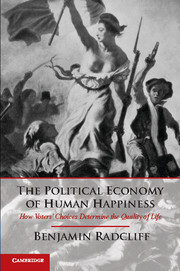Book contents
- Frontmatter
- Contents
- Acknowledgments
- Introduction
- 1 The Democratic Pursuit of Happiness
- 2 Market Democracy
- 3 Citizens or Market Participants?
- 4 The Scientific Study of Happiness
- 5 The Size of the State
- 6 Labor Unions and Economic Regulation
- 7 The American States
- 8 Between Market and Morality
- References
- Index
2 - Market Democracy
Published online by Cambridge University Press: 05 March 2013
- Frontmatter
- Contents
- Acknowledgments
- Introduction
- 1 The Democratic Pursuit of Happiness
- 2 Market Democracy
- 3 Citizens or Market Participants?
- 4 The Scientific Study of Happiness
- 5 The Size of the State
- 6 Labor Unions and Economic Regulation
- 7 The American States
- 8 Between Market and Morality
- References
- Index
Summary
The prior chapter traced the historical evolution of the idea that the ordinary person has a political right to the “pursuit of happiness,” such that representative governments, which are instituted precisely to protect that right, are inevitably charged with the task of seeing to “the greatest happiness for the greatest number,” even by those who believe that this charge is best served by leaving the task to the market. This basic understanding of happiness and of the role of the state in fostering the conditions necessary for it was seen to be the product of a particular sociopolitical context that is conventionally understood, in today's lexicon, as market democracy. Having provided the structural conditions under which the question of how to maximize human happiness emerges as the central question of politics – that is, having defined the problem – market democracy also supplies the two strategies available for solving it: either (a) resisting popular demands for redistributive and regulatory policies on the hope that a relatively unrestrained market will actually best promote happiness or (b) consciously attempting to use the power of the state to improve human well-being by infusing principles of equity and justice into market outcomes through political means.
As students rather than practitioners of politics, we have the liberty of approaching this situation from an abstract and purely theoretical point of view. The present chapter thus develops a model of capitalist democracy, to illustrate the nature and logic of political competition over the production and distribution of human well-being within the context of the market society. I begin by considering how the essential feature of the market system – the commodification of labor – naturally produces, first, an inevitable division of society into social classes that the institution logically requires, followed by a liberal democratic political order that emerges to protect commodification (and resulting class division) as the market requires, and, subsequently, a pattern of political competition based upon class interests. As we shall see, normal politics within market societies naturally comes to be patterned upon the traditional Left versus Right dimension that was already apparent at the time of the American Founding and the French Revolution.
- Type
- Chapter
- Information
- The Political Economy of Human HappinessHow Voters' Choices Determine the Quality of Life, pp. 29 - 54Publisher: Cambridge University PressPrint publication year: 2013



